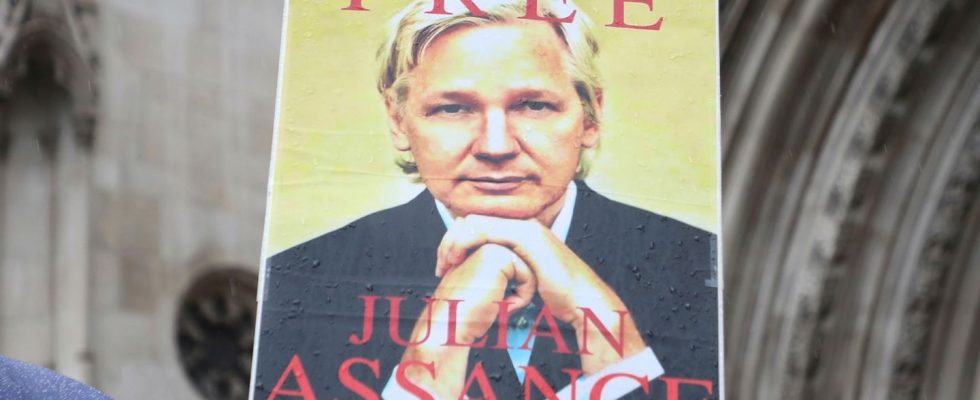Wikileaks founder
Threatening extradition to the USA: Assange has to wait for a decision
Julian Assange supporters protest in London
© Hugo Philpott / Picture Alliance
The USA wants Julian Assange to be extradited, but a corresponding hearing in London ended without result. The judges postponed their decision on whether the Wikileaks founder is entitled to an appeal.
There is a two-day hearing in Great Britain in what could be the decisive court case over the extradition of the Wikileaks founder Julian Assange to the USA initially ended without a decision. The two judges heard the arguments from Assange’s and Washington’s lawyers and decided against an immediate decision; Assange himself stayed away from the hearing in London on the second day. It was unclear when the judges would announce their verdict. If extradited to the USA, Assange could face up to 175 years in prison.
Assange fears being extradited to the USA
The two judges are supposed to decide whether Assange still has the right to appeal against possible extradition to the USA in Great Britain. If they decide that Assange’s legal remedies in Great Britain have been exhausted, his relatives fear he will be quickly extradited to the USA.
In this case, Assange’s supporters want to go to the European Court of Human Rights (ECHR) to have the extradition stayed.
Assange is accused in the USA of having published around 700,000 confidential documents about US military and diplomatic activities starting in 2010. The papers contained explosive information about wars, especially in Iraq and Afghanistan, including the killing of civilians and the mistreatment of prisoners.
Assange’s lawyer Edward Fitzgerald argued that his client had only done journalistic work when he published confidential US documents. He accused the US of “political” prosecution after revealing “serious state crimes”.
USA speaks of “rule of law and evidence”
The defense argued that previous cases Assange lost contained “legal errors.” In addition, the threatened decades-long punishment is “disproportionate”.
US government lawyer Clair Dobbin said the charges were “based on the rule of law and evidence” and that Assange’s actions were “unprecedented”. He “indiscriminately and knowingly published the names of people who acted as sources of information for the United States,” she said. This distinguishes it from other media organizations.
Another of Assange’s lawyers, Mark Summers, then criticized Dobbin for not addressing the fact that he had uncovered “state-level crimes.” “We haven’t heard back,” he said, continuing that it was “protected conduct” under British law.
Assange did not follow the hearing via video due to illness, as his lawyer had announced at the start of the hearing. Dozens of Assange’s supporters gathered again in front of the courthouse to show their support for the 52-year-old.
Assange would not be on trial in Germany
The process is being followed with great international attention. When asked, a spokeswoman for the Foreign Office in Berlin referred to a “discrepancy” between “our legal understanding and that of the USA”. Acts like Assange’s are “not punishable in our system.” This is the stance taken by Federal Foreign Minister Annalena Baerbock (Greens), who called for Assange’s release before taking office, including in discussions with foreign colleagues.
In view of the threat of extradition, Assange’s relatives had warned in recent weeks that his health was deteriorating. His lawyers also pointed out a possible risk of suicide. Assange has been imprisoned for twelve years – he found asylum in the Ecuadorian embassy in London for seven years and spent another five years in London’s Belmarsh maximum security prison.

